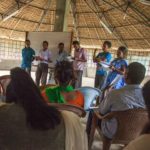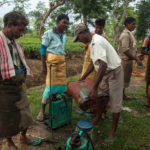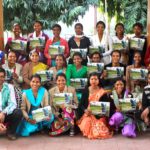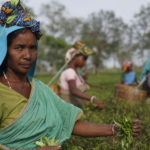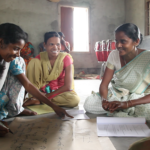Building a Legal Network to Advance the Rights of Tea Garden Workers
Winners’ Citation:
The Namati staff who shortlisted the prize entries for the jury thought this program was a shining example of impact and sustainability. Working mainly with tea workers in Assam, there are upwards of a million potential beneficiaries and the model has great potential for growth. It demonstrates a highly sustainable method in training the tea workers themselves as community paralegals. It employs right-to-information requests, uses female paralegals in meetings with state officials and succeeds in getting regular meetings to voice complaints. They also use public interest litigation around unusually high maternal mortality rates, and use advocacy coupled with grassroots intervention – the paralegals gather micro and macro data to inform and lead their advocacy campaigns around maternal mortality and the minimum wage. The lessons learned are thoughtful and inspiring.
The background to Nazdeek’s Work.
Download a case study that illustrates Nazdeek’s work.
India has robust human rights jurisprudence and progressive laws, however poor implementation of these laws and court decisions coupled with weak community engagement, hinder full realization of these rights. While India’s public interest litigation affords an exceptional opportunity to improve the lives of large groups within society, gaps in legal literacy, and distances between lawyers, grassroots activists, and affected communities inhibit effective implementation. For example, strategic litigation often requires extensive research and data gathering at various stages of the litigation, including the monitoring implementation of court orders. Grassroots NGOs and community members are often left out of the litigation process, and struggle to access legal literacy trainings to identify and document abuses. Local lawyers often lack resources and/or capacity to carry out adequate ground level research required for litigation, resulting in barriers to justice. As a result, countless violations go unaddressed and unaccounted for. Consequently, there is an urgent need for community-driven mechanism to identify, monitor and address human rights violations.
Despite constitutional and international human rights obligations aimed at protecting the lives of women, more women die of pregnancy-related deaths in India than anywhere else in the world (WHO 2011). Assam, a state in the Northeast of India leads the country with the highest maternal mortality ratio, 328 vs. a national rate of 178. Assam is also the home of more than half of India’s tea production, with nearly 1 million workers contributing to an expected turnover of of Rs 33,000 crore (US$5 billion) by 2015. Despite these figures, tea garden workers are the lowest paid of all organized sectors in India, earning a mere Rs 94/day ($1.20 USD). Forcibly brought from neighboring states to work in the British tea gardens from as far back as 1840, the workers endured slave- like conditions for over 100 years. Modern-day slavery persists with tea garden workers experiencing appalling working and living conditions as well as their right to indigenous identity.
For the past two years Nazdeek has been partnering with local activists and community leaders in Assam to build a legal network to advance the rights of tea garden workers.
- Tea garden worker and daughter who have benefitted from maternal health campaign. Photo by Rajan Zaveri © Nazdeek.
- Training staff of Nazdeek’s partner PAJHRA, which campaigns for India’s minority groups. Photo by Rajan Zaveri © Nazdeek.
- Tea sprayers who are often exposed to toxic chemicals when treating tea plants. Photo by Rajan Zaveri © Nazdeek.
- Female paralegals from End MM Now campaign at the launch of the report “No Time to Lose” © Nazdeek.
- Nazdeek paralegals from the End MM (maternal mortality) Now training program. Photo by Rajan Zaveri © Nazdeek
How Nazdeek uses grassroots legal advocates to address its issues.
Nazdeek aims at bridging gaps by strengthening the legal capacity of grassroots activists, lawyers and affected community members to use the legal system to address human rights violations. Nazdeek adopts a multi-faceted approach to legal empowerment, engaging with a range of actors and fuses litigation, capacity building, research and advocacy.
The legal empowerment programs focus on socioeconomic rights, including labor, health and nutrition rights, and access to judicial and non-judicial remedies. The training sessions expand understanding of rights, and build skills to conduct human rights investigation, draft and file complaints with administrative bodies, collect evidence for litigation and strengthen oral advocacy and media skills. The end outcome is unique as we use the legal mobilization to tackle life-threatening issues such as maternal mortality, malnutrition and illegal demolitions.
Key legal strategies involve:
1) Building of a Legal Network to Increase Access to Justice
Through on-the-ground capacity building, we build a network of activists and pro bono lawyers to increase access to justice for marginalized groups. The trainings center on a range of issues: (1) relevant rights & entitlements, (2) fact-finding & documentation strategies, (3) filing of grievance complaints (4) media & campaign advocacy and (5) monitoring & evaluation strategies. A network of pro bono lawyers is established through smaller, workshops in which skill sharing is exchanged between Nazdeek and the lawyers. The model is tailored towards identifying pro bono lawyers based on interest and commitment, and then soliciting assistance on concrete legal projects.
2) Increase Use of Grievance Redressal Mechanisms to Address Violations
Assisting community members and grassroots NGOs in filing of grievance complaints and strategic petitions to increase workers’ access to labor health, food and housing services. Specifically, we provide on-the-ground support to lawyers and grassroots activists in various forms of legal intervention (legal petitions grievance complaints) to increase accountability in the delivery of services. To ensure that benefits and entitlements are obtained at the local level, we adopt a tiered legal approach to our interventions. This includes complaints filed in the district and labor court, and within the internal tea garden grievance channels, as well as strategic petitions filed at the High Courts.
3) Support Advocacy Campaigns at State, National & International Levels
Providing strategic legal and advocacy support in development of campaigns to improve working and living conditions of tea garden workers in Assam. Activities include development and delivery of capacity building programs to CSOs and activists on relevant laws, development of campaign materials, draft and publishing of media articles, and meetings with government officials, certifying companies, and tea plantations to advocate for better conditions.
Key lessons that would be useful to others.
Nazdeek says: “We’ve learned a number of lessons along the journey of Nazdeek’s legal empowerment efforts. For starters, we’ve learned that there is a definite need for an organization which centers on legal capacity building at the grassroots level. We’ve also learned that when activists and community members are armed with legal tools, structural changes –whether at the state level or at a local individual level – can and do emerge. Further, we’ve learned that there must be a sustained, continuous program of capacity building that extends far beyond a 1 or 2 off training. The work takes time. We’ve been present in Assam for over 2 years now, and our work continues with new and emerging challenges.
Importantly, we’ve learned that legal advocacy must be tiered, that ground impact follows with interventions at various stages of the accountability ladder. While an impact case at the High Court offers great potential for systemic relief, the effect on the lives of everyday people is highly dependent on activists and community members aware of the litigation, and monitoring implementation of the court order. And beyond strategic cases, complaints filed with administrative officials or welfare officers at the tea garden level hold power.
We’ve learned that building a collective of paralegals who identify gaps in service deliveries/entitlements through a rights-based framework is very possible, but coordinating these programs in partnership with a local CBO makes the programs much more sustainable. One of our key learnings centers on the challenges in establishing pro bono lawyers to assist paralegals. Over the last 2 years we’ve had to change our strategy in building up a cadre of district lawyers. What started as large 20+ person training sessions, has now morphed into more 1-on-1 working meetings with lawyers to review applications, briefs, discuss legal strategies and then review of legal documents by email/phone. Capacity building is done on more conversational, meeting level as opposed to a traditional training session model. To address this gap in legal assistance and expand our pool of pro bono lawyers at the district level, we have established a pioneer human rights legal clinical program with Tezpur Law College. The clinic serves as an incubator for pro bono legal practice, exposing students to the value and importance of human rights & social justice at the rural level.
Another key learning relates to engagement and retention of paralegals. Engagement by paralegals may fluctuate be due to a host of factors: differences in participants’ background, gender, occupation and literacy levels etc. An evaluation process has revealed the need for more frequent engagement with participants through a series of monthly meetings. In particular, the meetings have been crucial to address a number of issues that volunteers faced, and which were hindering the ability to report cases of violations. Critically the meetings are most effective when they cover both substantive areas of law as well other issues such as behavioral/personality development, civic education and use of media.
There is also a need for the participants and community members to know that there documentation efforts are resulting in action. The recent report and meeting with district level health officials galvanized commitment in the program by the paralegals.”
Advice for others running similar programs.
Nazdeek says: “Our advice relates to adopting a tiered approach to the program. We have found that undertaking legal interventions with community members at the grassroots level and then coupling these efforts with top-level activities at the State or National level have strengthened the legal empowerment outcomes. For example with the State Wage campaign for tea garden workers in Assam, our ground-level trainings with members of AASAA helped strengthen legal literacy at the grassroots level, sharpening the arguments and claims raised by the activists. In tandem we developed multi media products (360 interactive on the tea garden, created cutting edge advocacy materials, leaflets, etc.) and held meetings with government officials such as the Labor Minister and members of the Labor Commissioner’s office. This coordinated effort has proven successful in raising the issue at various levels.”



